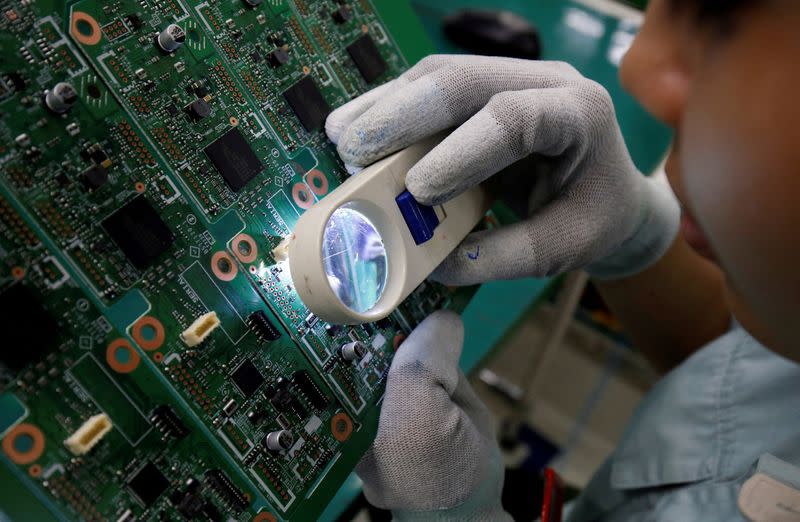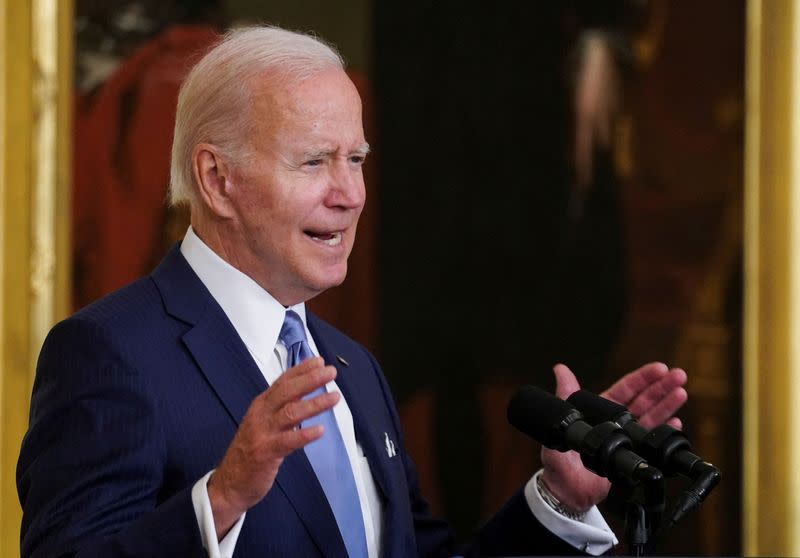US expects to upgrade Vietnam ties, risks China anger
By Francesco Guarascio
HANOI (Reuters) -The United States expects to elevate its diplomatic relations with former foe Vietnam to the top level when President Joe Biden travels to Hanoi in a week, in a move that may irk China.
Fearful of the potential reaction from its much larger neighbour, Vietnam had initially expressed caution about the upgrade. That led the Biden administration to multiply efforts to persuade the southeast Asian nation, including through visits of high-ranking members of the U.S. government in recent months.
The unprecedented push has led Washington to expect to be elevated to the top tier of Vietnam's diplomatic ranking, together with China and Russia, from two notches below now.
Biden said it publicly in July and officials in both countries have since informally expressed optimism about the two-step upgrade, although no official statements have been released from either government.
China's foreign ministry called for the United States not to target a "third party" when it engages with other countries in Asia.
"We believe that when dealing with relations with Asian countries, the United States should abandon Cold War zero-sum game mentality, abide by the basic norms of international relations, not target a third party, and not undermine regional peace, stability, development and prosperity," foreign ministry spokeswoman Mao Ning told a daily briefing in Beijing on Monday.
Perhaps seeking to assuage Beijing, Vietnam is discussing top-level visits to Hanoi after or even shortly before Biden's arrival on Sept. 10, with officials saying China's President Xi Jinping or Premier Li Qiang could meet Vietnamese leaders in the coming days or weeks.
China's foreign ministry did not immediately respond to a request for comment on the idea of such a visit on Monday, though they did confirm that Li, and not Xi, would attend the G20 world leaders summit in India this Saturday and Sunday.
Li will also attend the ASEAN summit in Jakarta which runs from Tuesday to Thursday.
BUSINESS COOPERATION?
Risks that a double upgrade with Washington may not go down well in Beijing remain high, but Vietnam's communist leaders may have calculated the best timing for the move is now as U.S. relations with China are "likely to get worse in the future", said Le Hong Hiep, a senior fellow at Singapore's Iseas–Yusof Ishak Institute.
“Vietnam's economy badly needs a boost in capital, technology, and market access,” said Alexander Vuving of the Hawaii-based Inouye Asia-Pacific Center for Security Studies, noting that may have been a key reason for the possible upgrade.
A boost of U.S. military supplies to Hanoi has also long been discussed but no immediate deal is expected as these talks take time, Hiep said.
Meanwhile, Vietnam is talking with several other countries to upgrade and expand its mostly Russian-made arsenal, and has recently engaged in multiple high-level defence meetings with top Russian officials.
Supporting Vietnam's ambitions to become a hub for the semiconductor industry is also part of Washington's inducements, but public funds so far available under the CHIPS Act are very limited.
The U.S. may offer more, said Vu Tu Thanh, head of the Vietnam office of the US-ASEAN Business Council.
Energy is another sector where cooperation could increase as Vietnam prepares to become a player in Liquefied Natural Gas (LNG) and offshore wind although administrative and funding delays are dampening the mood.
The upgrade of relations is expected to boost U.S. firms' plans in Vietnam. Planemaker Boeing and energy firm AES may make announcements during Biden's visit, people familiar with the plans said.
Boeing hopes to sell as many as 50 of its 737 MAX jets during the visit, they said. The companies declined to comment.
The U.S. is already Vietnam's largest market for its exports and U.S. customs procedures could be eased to boost trade, Thanh from the US-ASEAN Business Council.
(Reporting by Francesco Guarascio @fraguarascio; additional reporting by Trevor Hunnicutt, Khanh Vu, Lizz Lee, Martin Quin Pollard and Tim Hepher; Editing by Lincoln Feast, Sharon Singleton and Alison Williams)

 Yahoo News
Yahoo News 

